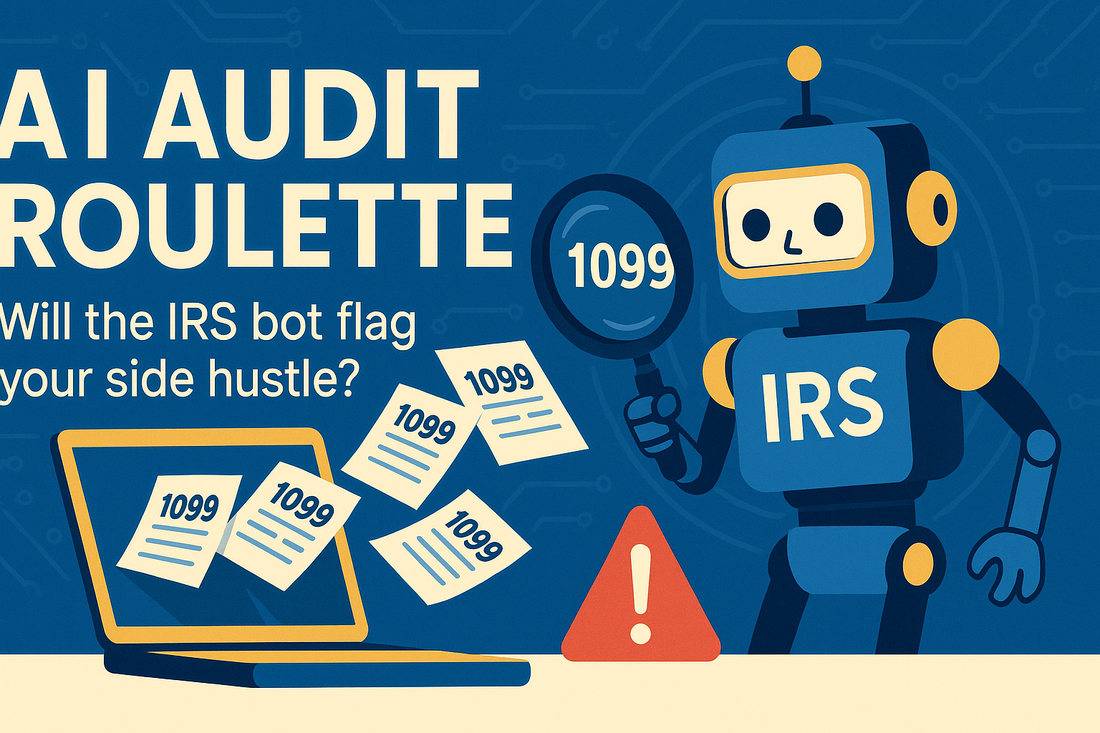
AI Audit Roulette: Will the IRS’s New Robo-Auditor Flag Your Side-Hustle?
Share
From Paper Audits to Predictive Policing
What if an algorithm, not an agent, decided whether the IRS peeks into your bank account this year? That day is here. The IRS confirmed it is piloting artificial-intelligence models to select returns for examination as part of its multi-year modernization push funded by the Inflation Reduction Act. IRS
Facing chronic staffing gaps and TIGTA warnings that traditional methods “cannot keep pace,” the agency argues AI will stretch limited human resources further. TIGTA
Why Everyday Filers Are in the Crosshairs
1. The 1099-Everything Explosion
-
1099-K: After two delays, the threshold starts dropping toward $600 in the 2025 filing season, sweeping millions of PayPal, Venmo and Etsy users into mandatory reporting. IRSKiplinger
-
1099-NEC already covers Uber, Instacart, Fiverr and other gig-apps.
-
1099-DA: A brand-new crypto form will force brokers to report every digital-asset sale starting with 2025 transactions. IRS
Because those forms feed directly into the IRS database, the AI isn’t guessing— it already knows your gross receipts before you click “e-file.”
2. Small Dollars, High Volume = Easy “Wins”
Early IRS briefings say the model scores returns by discrepancy density—lots of little mismatches are simpler to prove than one complex shelter. That makes part-time resellers and moonlighting freelancers ideal training data. Taxpayer Advocate Service
The Three Red Flags the Robo-Auditor Loves
| ⚠️ Red Flag | Why It Trips the Model | Quick Fix |
|---|---|---|
| Big-App, Small-Return | A $7 k 1099-K but only $1 k profit reported | Reconcile sales and expenses; attach a profit-and-loss statement |
| Peer-to-Peer Swings | $10 k+ through Cash App/Venmo, no Schedule C or gift memo | Use a dedicated business account; tag personal reimbursements clearly |
| Crypto Cash-Outs Without Basis | Bank deposits from exchanges but no matching Form 8949 | Track cost basis (apps like CoinTracker), or risk Form 1099-DA mismatch |
How to Stay Off the List: A Three-Layer Audit Shield
-
Perfect Paper Trail – Match every 1099 total exactly on Schedule C/D.
-
Segregate the Money – Route side-hustle cash into a separate checking account—or, better, a simple grantor trust or LLC—so personal transfers stay invisible.
-
Real-Time Receipts – Snap or scan expenses weekly; the algorithm can’t penalize income that’s offset by documented costs.
Pro-tip: A trust account offers a single K-1 summary, replacing dozens of tiny 8949 lines and lowering “discrepancy density.”
Know Your Rights—Bias Isn’t Fixed
A 2024 GAO study found Black taxpayers were up to five times more likely to be audited, even under data-driven selection systems, and urged the IRS to disclose its model factors. If you’re flagged, you can file a Freedom-of-Information Act request citing GAO-24-106126 to see what triggered your case. Government Accountability Office
Real-Life Snapshot
Maria, a Poshmark reseller, grossed $4 k last year. A CP2000 notice hit when the AI found her unreported 1099-K. She moved the business into a family trust, kept monthly spreadsheets, and her follow-up audit closed “no change.” Proof that paperwork—and entity walls—still beat robots.
Closing Thoughts & Free Resource
The IRS’s robo-auditor is here to stay, and its first targets are ordinary people who mix business and personal money. Tight bookkeeping and a simple entity wrapper can make you nearly invisible to the algorithm.
